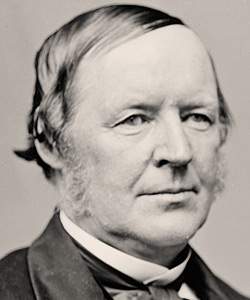Hugh McCulloch (American National Biography)
Scholarship
Coming from a Federalist-National Republican political lineage, McCulloch described himself as "an original Henry Clay Whig" who supported all elements of Clay's American System, although he had misgivings about the high protective tariff, which he saw as detrimental to the country's commercial interests. When the Whig party disintegrated in the mid-1850s, McCulloch joined the new Republican party and was quietly antislavery, though like many conservative former Whigs he lamented the spiraling sectional controversy that divided the nation. Still, he saw the differences between North and South as irreconcilable and believed that only war could curb the aggressive and expansionist slave power.
As the war began, McCulloch continued to head the Indiana banking system and in 1862 he lobbied against creating a national banking system, which he saw as "greatly prejudicial to the State banks." The following year, however, Congress passed an amended version of the bill, which satisfied McCulloch's objections, and he accepted an invitation from Secretary of the Treasury Salmon P. Chase to become comptroller of the currency for the new system and moved to Washington to organize the National Currency Bureau. Working with Chase and then William Pitt Fessenden when Chase resigned in 1864, McCulloch was instrumental in getting the banking network off to a solid start. When Fessenden resigned in March 1865, McCulloch agreed to Abraham Lincoln's offer of the Treasury portfolio, and he continued under Andrew Johnson's administration.
As the war began, McCulloch continued to head the Indiana banking system and in 1862 he lobbied against creating a national banking system, which he saw as "greatly prejudicial to the State banks." The following year, however, Congress passed an amended version of the bill, which satisfied McCulloch's objections, and he accepted an invitation from Secretary of the Treasury Salmon P. Chase to become comptroller of the currency for the new system and moved to Washington to organize the National Currency Bureau. Working with Chase and then William Pitt Fessenden when Chase resigned in 1864, McCulloch was instrumental in getting the banking network off to a solid start. When Fessenden resigned in March 1865, McCulloch agreed to Abraham Lincoln's offer of the Treasury portfolio, and he continued under Andrew Johnson's administration.
Terry L. Seip, "McCulloch, Hugh," American National Biography Online, February 2000, http://www.anb.org/articles/04/04-00682.html.





